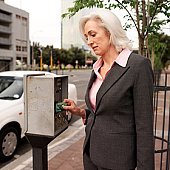Is that fair? Probably not, but it’s true.
A 2012 survey by the Society of Human Resources Management indicates that as many as 47% of employers check credit before making hiring decisions. The premise is that individuals with poor credit are probably having financial difficulties and so might be more likely to embezzle funds or sell company secrets for a profit.
That has no bearing on your ability to perform a myriad of jobs to an employer’s satisfaction, but it still might have a bearing on whether you’re chosen for the job.
You can deny them the right.
Before a potential employer can check your credit, you must sign giving your permission. You can refuse, but then what are your chances of being hired? Refusal could be (to them) a clear indication that they’ll see something damaging on that report. They may not be able to turn you down based on the refusal, but it’s easy enough to find some other reason to choose a different candidate.
What can potential employers see?
They can’t see your credit scores, but they can see all of your identifying information such as address, date of birth and previous employment information. They can also see your trade lines and credit accounts and take note of the number and nature of inquiries into your report. Finally, they can see things of public record, such as information on collections, foreclosures, bankruptcies, etc.
They’ll also see any mistakes that appear on your credit report:
Credit bureaus are quick to admit that up to 70% of all credit reports contain some kind of error. It may be something simple, like a misspelling of your name, or it may be something serious. For instance, a missed keystroke could put someone else’s collection on your report just because your social security numbers are one digit apart.
“70% of all credit reports contain some kind of error”
That’s one of the reasons why it’s important for every citizen to access their credit reports with regularity, and to read them carefully. When you spot a mistake and report it quickly, it has less time to do damage.
“Thieves can open new accounts completely without your knowledge”
The second reason is identity theft. No one is immune from the threat, and one of the fastest ways to discover it and stop it is by keeping a close watch on your credit accounts and your credit report. Thieves can open new accounts completely without your knowledge. All they have to do is use a bogus address.
So be careful. Get your credit report and read it carefully. If there’s an error or an account you don’t recognize, report it immediately.





